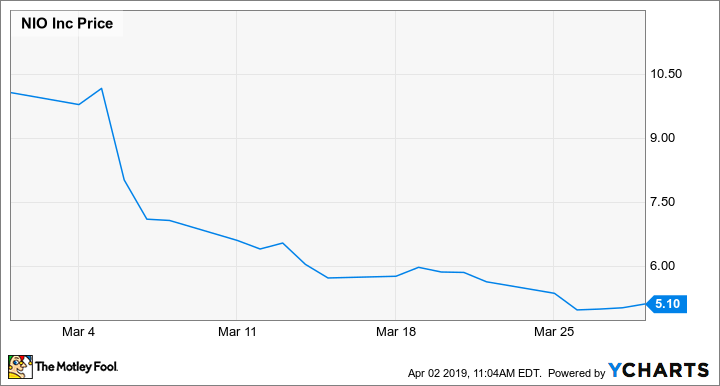March was a rough month for investors in NIO (NIO -3.50%). Shares of the Chinese electric-vehicle start-up lost nearly half their value last month, falling from $9.57 at the end of February to $5.10 when trading closed on March 29.
What happened? There were a couple of factors behind the decline. First, NIO's stock dropped sharply after it reported on March 5 that its fourth-quarter earnings were below Wall Street's expectations. More recently, investors have been growing concerned about the Chinese government's decision to cut subsidies for electric-vehicle buyers.
Is it time to abandon NIO, or is this an opportunity to buy? Let's take a look at what happened.
A tough fourth quarter dimmed NIO's outlook
NIO said on March 5 that it lost $509.5 million in the fourth quarter, or $0.49 per American depositary share. That was considerably worse than the $0.32-per-share loss expected by Wall Street, but it wasn't the only issue.
Investors were also concerned about NIO's guidance for 2019, which wasn't rosy. The company said that while demand in December had been strong ahead of an expected reduction in electric-vehicle subsidies in 2019, sales had slumped in January and February. That suggested that the December surge had "pulled ahead" sales, and wasn't necessarily a sign of organic demand growth.

NIO's ES8 is an upscale seven-passenger electric crossover SUV. Image source: NIO.
That led NIO to forecast a greater-than-expected decline in deliveries in the first and second quarters of 2019, and its projected revenue was adjusted accordingly -- another reason why investors might have bailed on the stock following the earnings report.
NIO is still planning to launch its new ES6 crossover SUV in May, and the company hopes that the ES6 will drive sales growth in the second half of the year -- if the sluggish Chinese market cooperates.
The Chinese government isn't helping
Developments since NIO's March 5 report have added to the uncertainty around the company's near-term growth prospects. New rules that took effect on March 26 drastically reduced -- by as much as 75% -- subsidies available to electric-vehicle buyers from the Chinese government. Not only did the national government cut its own subsidies sharply, it also prohibited provincial and municipal governments from offering electric-vehicle subsidies of their own.
Why the big cuts? Part of the reason is domestic Chinese politics: Beijing doesn't want local and regional governments using protectionist policies to give advantages to local automakers. The government also wants to ensure that up-and-coming domestic manufacturers of electric vehicles and plug-in hybrids (like NIO) aren't just relying on subsidies to drive sales.
Are things looking up now?
NIO's guidance for first-quarter deliveries wasn't great, but the company said on April 2 that it did better than it had expected. NIO delivered 1,373 of its ES8 electric crossover SUVs in March, giving it 3,989 for the quarter -- above its guidance range of 3,500 to 3,800.

Data source: NIO. The chart shows deliveries of NIO's ES8 since its launch in June of 2018.
That's not really enough to be wildly optimistic about NIO's near-term sales prospects, but it's something.
The upshot: NIO investors will need to be patient
NIO is often compared to Tesla (TSLA -0.64%) in that company's early days. The comparison is apt in more ways than one: Like Tesla's shares after the company's initial public offering, NIO's stock has been wildly volatile since its debut on the New York Stock Exchange last year.
Of course, in retrospect, we know that Tesla's early volatility was worth riding out. Will NIO investors feel similarly in time?
It's hard to say right now. On the one hand, China is in the midst of what is probably a cyclical slump in auto sales, the country's first in many years. That, plus the big cut in subsidies, will make for tough going for a small company like NIO for a while.
On the other hand, NIO is pretty well funded, its products have received good reviews, and it's likely to have access to funding if needed. And stepping back a bit, NIO has one big advantage over rival electric-vehicle start-ups like Rivian and Lucid: It's already shipping a product.
I'm inclined to think NIO will weather this storm, and that its ES6, which looks very good on paper, will help give it a boost when the Chinese market picks up. If that's how it plays out, it's probably a good buy at current prices -- but it may require patience, and a strong tolerance for ups and downs.






